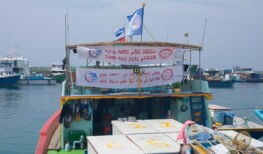Muizzu Calls for Climate Financing to Reclaim More Land

Photo: MV+
President Dr. Mohamed Muizzu has called on the international community to increase and loosen restrictions on climate financing for small island developing states (SIDS) like the Maldives, highlighting the necessity of building “climate-resilient” islands such as Hulhumale and Ras Malé
In an opinion article published in The Guardian on Saturday, ahead of the Fourth International Conference on Small Island Developing States (SIDS4) in Antigua and Barbuda this week, Muizzu outlined his plea for overhauling climate financing mechanisms. He criticised current funding metrics and mechanisms used by financing agencies.
“Not Our Fault”
The message of President Muizzu’s opinion article echoes familiar rhetoric used by previous Maldivian leaders at global climate discussions, seeking climate adaptation funds.
Muizzu emphasised the Maldives’ early recognition of the climate crisis, noting that the country first raised the alarm over rising sea levels in 1989.
“Thirty-five years later, has the rest of the world truly been listening? If you look at how the world’s reaction to the climate crisis is funded, the answer is clearly ‘no’.”
Despite contributing only 0.003 per cent to global emissions, the Maldives is one of the first countries to experience the severe consequences of climate change, he stressed.
“Wealthier nations have a moral responsibility to communities like ours. Yet Sids are given only about 14% of the finance that the least developed countries receive.”
Don’t Call Us Rich, Call us Vulnerable
Muizzu went on to describe the current global financial architecture as “outdated and not fit for purpose”
“Its use of metrics such as Gross National Income (GNI) and Gross Domestic Product (GDP) skews our economic reality, painting small island developing states as wealthier than we are, barring us from critical funding opportunities.”
Furthermore, the Maldives’ healthy tourism industry portrays the country as an emerging economy which restricts access to cheaper financing schemes, he wrote.
“The islands of the Maldives are spread over 90,000sq km. We are 99% water and 1 % land – no income metric can capture that.”
For this reason, the Maldives will advocate for the adoption of a multi-dimensional vulnerability index (MVI) at the upcoming Fourth International Conference of SIDS, Muizzu announced.
It is a metric that would measure the “unsustainable structural vulnerabilities” faced by SIDS by considering factors beyond economic output. He called on multilateral institutions such as the World Bank and sovereign governments to “embrace this challenge”.
“We simply ask the world to step into our shoes and realise how climate financing can be reformed for the better to support true resilience. We seek not charity but equity and justice in addressing a crisis we did little to create.”
Artificial Islands – “True Climate Adaptation”
Muizzu said reclamation of artificial islands such as Hulhumale should be considered climate adaptation projects, as it is equipped with “inherent features of climate resilience.”
He claimed that such projects being “classed as infrastructure work” denies the Maldives climate funding for them.
Hulhumale, developed to ease the congestion of the capital Malé, was a lifeline, Muizzu added, stressing that the island was physically raised two metres above sea level and equipped with buffer zones between the reef and island to enhance resilience.
“Similarly, our upcoming project, Ras Malé, aims to be the Indian Ocean’s first eco-city, raised three metres above sea level. This is true climate adaptation if ever I saw it.”
Critics have long warned that successive governments’ efforts to seek climate funds do not match efforts back home to preserve natural ecosystems, particularly in light of the impact major land reclamation projects like the Gulhifalhu Development Project have on marine ecosystems.
Muizzu, however, claimed that the Maldives takes sustainable construction and environmental stewardship seriously. He highlighted the recent suspension of land reclamation and dredging projects to reduce stress on coral reefs during the ongoing mass coral bleaching event brought on by the El Nino.
The Environment Protection Agency (EPA) suspended all projects that directly or indirectly stress coral reefs until 10 June. The government has, however, bypassed this suspension for one project and is considering issuing exceptions to more projects to avoid paying fines for delays.









